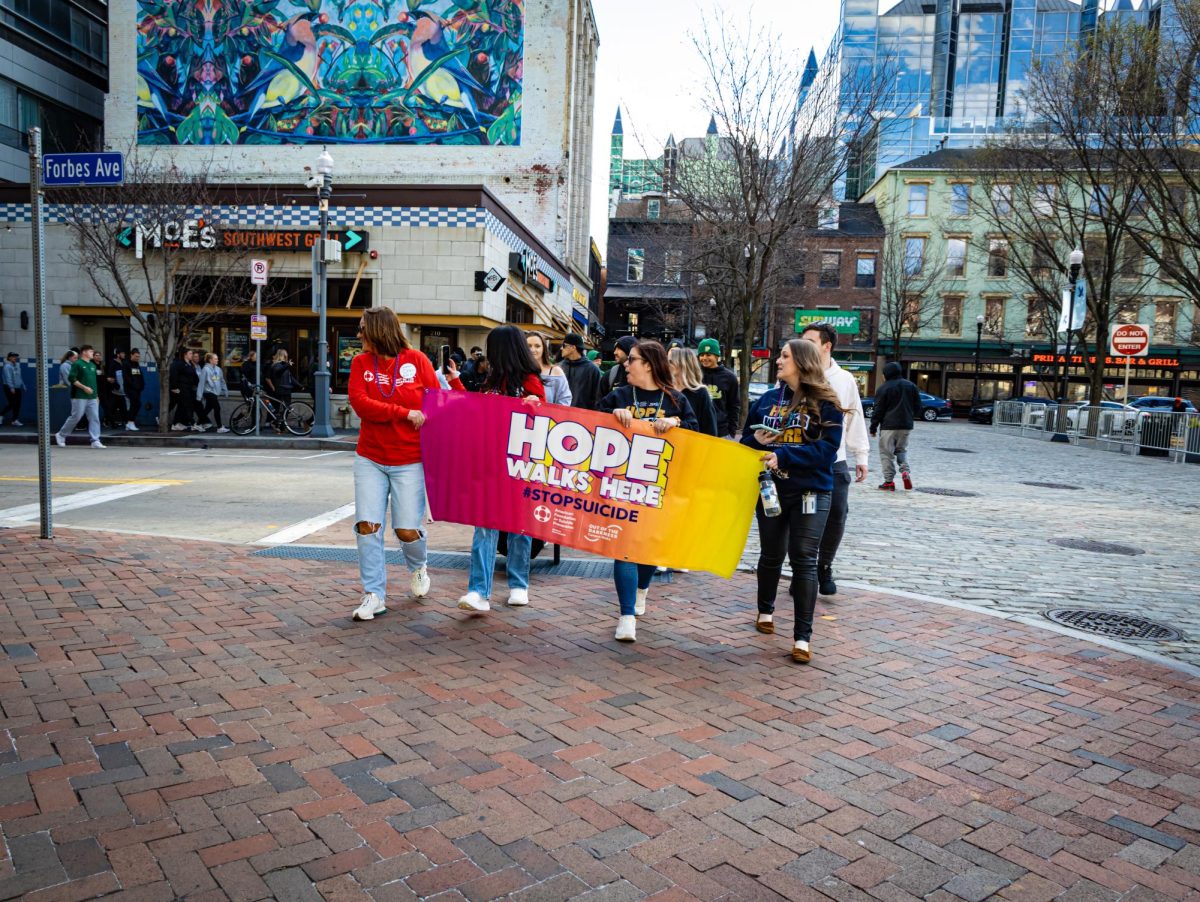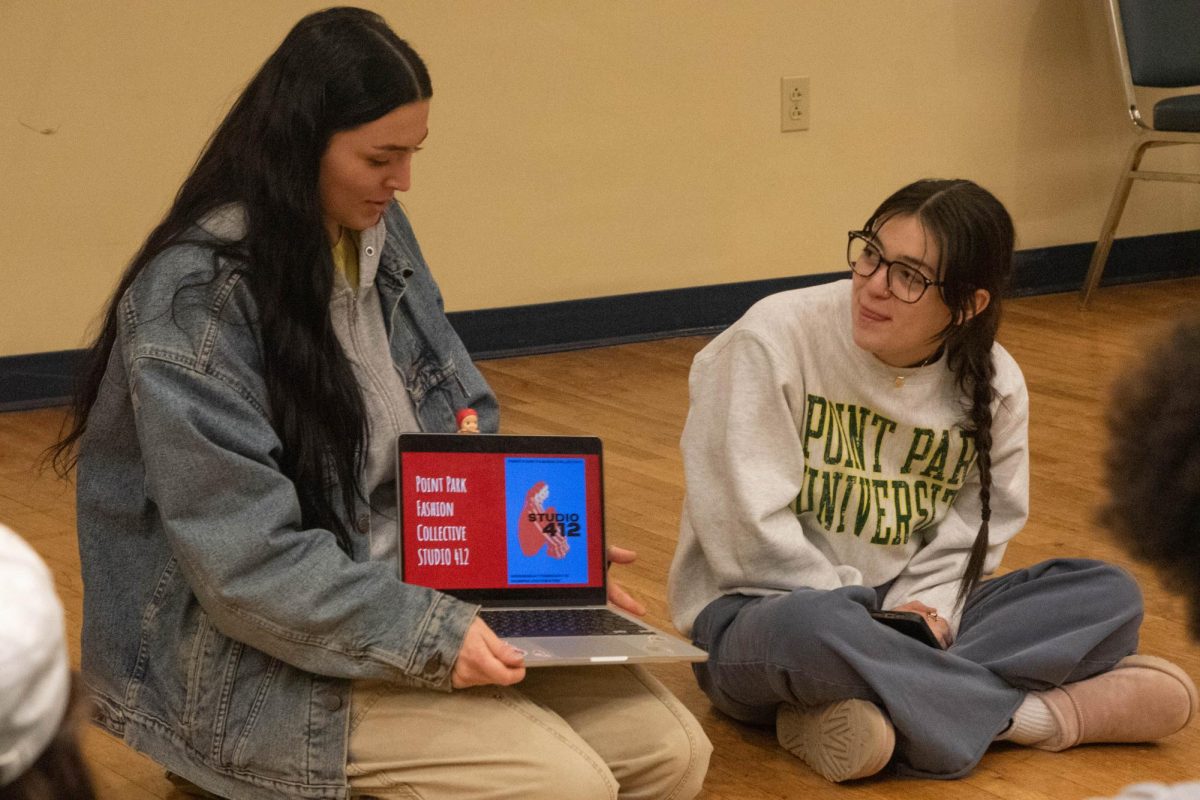
Darrell Brock stood in front a group of Point Park students on the second floor of Lawrence Hall and ripped off an angry poem about a day that was ruined by a piece of gum that was stuck to the bottom of his shoe.
Outside forces such as family members, close friends, and college debt spurred Jacob Mullins to write and perform his irony-laced poem “Peachy” at the first meeting of the “Light House Collective” slam poetry group.
Those two performances were among the collection of avant garde riffs that inspired the group of ten people present to fill the air with the sounds of beatnik-like fingers snapping that lets the performers know they're being felt, not just heard, without disturbing the calm atmosphere.
“Today poetry is more relatable to the audience. You talk about a situation [that] people can relate to,” Brock, President of the Light House Collective, said.
The Light House Collective was the brain child of Brock, who has been writing and presenting poetry about anything that triggered, from a piece of gum stuck to his shoe to food he liked in high school.
“After one of my performances, which I thought went horrible, I got the whole auditorium applauding me and my teacher encouraged me to keep writing,” Brock, which hooked him on slam poetry, said.
Before attending Point Park, Brock had attended Delaware College of Art and Design where he majored in animation and visual effects. He had attended an open mic session, and he loved the environment and the people that were there.
“There was musicians playing music, random people reading their poems and it was a very artistic, chill vibe and this has been in the back of my mind to start something similar,” Brock said.
Point Park did not have a poetry club. Darrell saw and wanted to seize the opportunity.
“At Point Park, there [was] so much paper work and I had to wait a full semester to get my club approved and at DCAD I had the club in my dorm room and then moved into a class room,” Brock said.
Majority of people who come across poetry, pushes it away, but only few gives it a second chance. This was Kate Walker’s experience.
“I use to hate it because it had to rhyme and be repetitive, and then I saw a video of this guy talk about his life and I saw his passion,” Walker, vice president of the Light House Collective, said.
Her understanding of slam poetry is throwing your thoughts onto paper and reading it with the same emotions you experienced when you had those thoughts. Also, this club is more than just reading poems and listening to them.
“We want to be able to use any sort of art medium and express what we have to offer to people who share similar interests. This includes, poems, stories, slams, etc.,” Walker said.
One does not have to write his or her own poetry in order to perform at the Light House Collective. On the stage, one will find number of Anthology books where anyone can choose something they like and perform it.
“People who don’t like poetry, just needs to give it a second chance, and by having books people can pick up a book and read a poem,” Brock said.
According to Walker, the club will have workshops that will help critique each other’s work to make it the best it can be; as well as having slam poetry competitions. During the club itself, one can read poems from an author he or she really likes, pieces they wrote themselves or just anything they've found interesting enough.
For most people writing poetry is a process and something has to trigger a thought. This is the case for Jacob Mullins. He has a notebook filled with poems, and he keeps it with him at all times, so he can write down whatever inspires him.
“As treasurer, I advise Darrell on how the budget should be spent, and lend him advice on where to go with the club” Mullins, a senior English creative writing major and French minor, said.
For Mullins, poetry as a child was always just a bunch of rhyming schemes that were made for fun little sayings to put on Mother’s Day gifts.
What opened Mullins eyes to the world of poetry was when he heard a poem called “To This Day” by Shane Koyczan and the way this poet expressed his words, the way he told his stories, through poetry was pure beauty, and he was hooked ever since.
“So I started writing pieces that reflect my thoughts, interpreted with whimsy and sometimes sorrow, and they are not meant to me or others to feel sad but to make it relatable to the people listening,” Mullins said.
Courtney Apple, a sophomore who found out about the club through friends, has been writing since she was 13, and her inspiration is her grandmother.
“I love writing,” Apple said. “My grandmother was a professor at West Virginia University, and so I grew up writing stories and poetry and sending them to her and she would help me get better.”
In relation to writing at a young age, Apple continued to write and joined the high school’s poetry club. She is a fan of slam and spoken word because she can talk about her experiences and talk about something someone else would not talk about.
“In slam poetry, you analyze it and in spoken word, you talk about your experiences and make it more relatable, and usually I get an idea when I’m on the bus,” Apple said.
According to Mullins, if someone is able to hold a pen or pencil and know how to write on paper, then they can write poetry. It is an art form that comes in every shape and size.
“I enjoy writing comedy pieces,” Mullins said. “I find that if people can laugh at my sporadic tangents on the things I find funny it is always worth writing pieces.
The Light House Collective is open for anybody who loves poetry whether they are a student or not.
“My vision is to have a national poetry team to compete in the national poetry slams. I don’t want to do it for money, but if you do, you get a hefty prize and you can be a bad ass poet,” Brock said.
According to Brock, the people who do not like poetry are people who do not understand it. Because when someone says poetry, everyone thinks of Shakespearean language and it certainly does not have to be that way.
“My plan is to dispel some of the old conceptions of poetry and show people it can be simple and relatable,” Brock said.
The Light House Collective meets biweekly on Mondays on the second floor of Lawrence Hall from 5 p.m. – 7 p.m.










